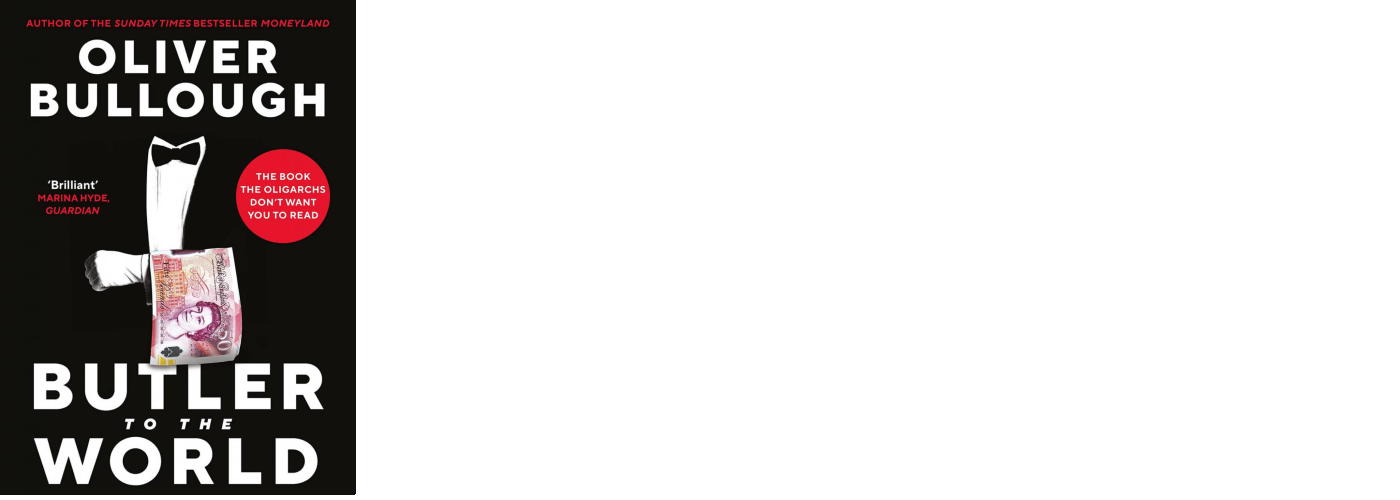Butler to the World by Oliver Bullough: ‘highly readable but thoroughly depressing’
Timely analysis of how Britain has helped to launder others’ fortunes

A free daily email with the biggest news stories of the day – and the best features from TheWeek.com
You are now subscribed
Your newsletter sign-up was successful
“Could a book ever be more timely,” asked Simon Nixon in The Times. Oliver Bullough’s Butler to the World is a “highly readable but thoroughly depressing” analysis of Britain’s role in enabling a “shadowy global super-rich” to “launder and hide their vast fortunes”.
The book advances the “surely unarguable” thesis that a large swathe of the country’s elite has “turned itself into a dark version of P.G. Wodehouse’s Jeeves”, catering to the whims of the world’s kleptocrats.
We’ve welcomed corrupt capital in all sorts of ways, said The Economist. Bankers and accountants help shady billionaires stash their wealth in offshore accounts. Reputations are laundered by our “reassuringly expensive” PR firms, while Britain’s claimant-friendly libel and privacy laws help bat away awkward questions. Bullough’s study is urgent and well-informed – and makes a mockery of Boris Johnson’s claim that no country “could conceivably be doing more to root out corrupt Russian money”.
The Week
Escape your echo chamber. Get the facts behind the news, plus analysis from multiple perspectives.

Sign up for The Week's Free Newsletters
From our morning news briefing to a weekly Good News Newsletter, get the best of The Week delivered directly to your inbox.
From our morning news briefing to a weekly Good News Newsletter, get the best of The Week delivered directly to your inbox.
According to Bullough, this all dates back to the Suez crisis of 1956, said Dominic Sandbrook in The Sunday Times. By laying bare “Britain’s diminished post-imperial status”, the crisis, he suggests, motivated the City to reinvent itself as an “amoral servant” of global wealth. While I am sceptical of this claim – the link with empire doesn’t seem quite clear – what follows is a “grimly fascinating” tour of the various legal and financial loopholes that have allowed Britain to prostrate itself “at the feet of the shady super-rich”.
One chapter explains how the tiny British Virgin Islands became a haven for off-shore money. Another explores the “murky world of Scottish limited partnerships” – an obscure financial vehicle that European criminals have exploited to hide stolen money “on an industrial scale”.
Especially revealing, given the current situation, is the chapter on the Ukrainian-born billionaire Dmitry Firtash, said Will Dunn in the New Statesman. Firtash, Bullough writes, was the “Kremlin’s man in Ukraine” during the premiership of Viktor Yanukovych.
In 2007, he “moved to Kensington” and was welcomed into the heart of the British establishment: he was “honoured by Cambridge University, introduced to the Duke of Edinburgh and invited to open trading on the London Stock Exchange”. He later bought a disused Underground station and was asked to advise the Foreign Office. His story, like many others in this fascinating book, reveals Britain’s shameful role in oiling the “wheels of Vladimir Putin’s gangster state”.
A free daily email with the biggest news stories of the day – and the best features from TheWeek.com
Profile 288pp £20; The Week Bookshop £15.99

The Week Bookshop
To order this title or any other book in print, visit theweekbookshop.co.uk, or speak to a bookseller on 020-3176 3835. Opening times: Monday to Saturday 9am-5.30pm and Sunday 10am-4pm.
-
 Why are election experts taking Trump’s midterm threats seriously?
Why are election experts taking Trump’s midterm threats seriously?IN THE SPOTLIGHT As the president muses about polling place deployments and a centralized electoral system aimed at one-party control, lawmakers are taking this administration at its word
-
 ‘Restaurateurs have become millionaires’
‘Restaurateurs have become millionaires’Instant Opinion Opinion, comment and editorials of the day
-
 Earth is rapidly approaching a ‘hothouse’ trajectory of warming
Earth is rapidly approaching a ‘hothouse’ trajectory of warmingThe explainer It may become impossible to fix
-
 Kia EV4: a ‘terrifically comfy’ electric car
Kia EV4: a ‘terrifically comfy’ electric carThe Week Recommends The family-friendly vehicle has ‘plush seats’ and generous space
-
 Bonfire of the Murdochs: an ‘utterly gripping’ book
Bonfire of the Murdochs: an ‘utterly gripping’ bookThe Week Recommends Gabriel Sherman examines Rupert Murdoch’s ‘war of succession’ over his media empire
-
 Gwen John: Strange Beauties – a ‘superb’ retrospective
Gwen John: Strange Beauties – a ‘superb’ retrospectiveThe Week Recommends ‘Daunting’ show at the National Museum Cardiff plunges viewers into the Welsh artist’s ‘spiritual, austere existence’
-
 Bad Bunny’s Super Bowl: A win for unity
Bad Bunny’s Super Bowl: A win for unityFeature The global superstar's halftime show was a celebration for everyone to enjoy
-
 Book reviews: ‘Bonfire of the Murdochs’ and ‘The Typewriter and the Guillotine’
Book reviews: ‘Bonfire of the Murdochs’ and ‘The Typewriter and the Guillotine’Feature New insights into the Murdoch family’s turmoil and a renowned journalist’s time in pre-World War II Paris
-
 6 exquisite homes with vast acreage
6 exquisite homes with vast acreageFeature Featuring an off-the-grid contemporary home in New Mexico and lakefront farmhouse in Massachusetts
-
 Film reviews: ‘Wuthering Heights,’ ‘Good Luck, Have Fun, Don’t Die,’ and ‘Sirat’
Film reviews: ‘Wuthering Heights,’ ‘Good Luck, Have Fun, Don’t Die,’ and ‘Sirat’Feature An inconvenient love torments a would-be couple, a gonzo time traveler seeks to save humanity from AI, and a father’s desperate search goes deeply sideways
-
 A thrilling foodie city in northern Japan
A thrilling foodie city in northern JapanThe Week Recommends The food scene here is ‘unspoilt’ and ‘fun’